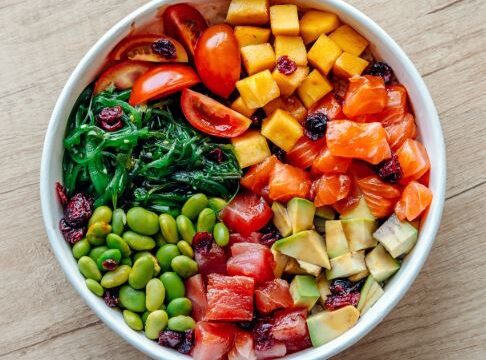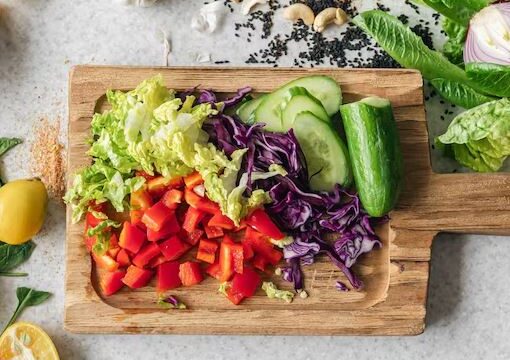Life changes can be exciting, unexpected, and sometimes overwhelming.
Whether it is a career shift, moving to a new city, ending a relationship, or welcoming a new family member, transitions can bring a wide mix of emotions.
While it is normal to feel uncertain during these times, the foods you choose each day can have a real impact on how well you adapt and stay grounded.
Eating with emotional strength in mind means nourishing both body and mind so you can respond to change with clarity, patience, and balance. Understanding the Connection Between Food and Emotional Strength Food influences how we feel in more ways than many people realize. The nutrients we consume affect hormone balance, neurotransmitter production, and even gut health—all of which play a role in mood regulation and resilience. During times of change, the body’s stress response tends to increase. When that happens, the need for steady blood sugar levels, hydration, and nutrient-dense meals becomes even more important. Eating nourishing foods can help prevent emotional fatigue and give you a greater sense of stability, even when life feels uncertain. Start with Foods That Steady the Mind When navigating change, one of the most helpful things you can do is keep your meals consistent. Eating at regular times and including a balance of carbohydrates, proteins, and healthy fats helps maintain steady energy levels. Whole grains such as oats, brown rice, and quinoa release energy slowly, which helps prevent mood dips linked to sudden drops in blood sugar. Pairing these with proteins like beans, lentils, tofu, or fish can further support focus and calmness. Fats from natural sources such as avocado, nuts, seeds, and olive oil are also essential for brain health. They help the body produce and regulate mood-supporting hormones. When you include these types of healthy fats in your meals, you are not just feeding your physical body—you are also supporting emotional endurance. Add More Color to Your Plate A colorful diet naturally supports emotional health. Brightly colored fruits and vegetables are rich in antioxidants that help reduce the effects of stress on the body. Leafy greens like spinach and kale are especially beneficial because they are packed with magnesium, a mineral known for its calming effects. Berries provide vitamin C, which can help protect the body’s cells from stress-related damage, while orange and yellow produce like carrots, sweet potatoes, and bell peppers contribute beta-carotene, another nutrient that promotes balance and well-being. Eating a variety of colors ensures that you get a wide range of vitamins and minerals. This diversity of nutrients helps the brain function optimally, which in turn supports clearer thinking and emotional resilience. Don’t Forget the Power of the Gut Many people are surprised to learn that the gut is closely connected to emotional health. A large portion of the body’s serotonin, a neurotransmitter associated with positive mood, is produced in the digestive system. A healthy gut can therefore lead to a more stable emotional state. Fermented foods like yogurt, kefir, sauerkraut, and kimchi help maintain a healthy balance of gut bacteria, which supports both digestion and mood. In addition to fermented foods, fiber-rich choices such as oats, apples, beans, and vegetables provide nourishment for good bacteria in the intestines. When your gut feels balanced, your mind is more likely to follow. Stay Hydrated to Stay Balanced Even mild dehydration can make it harder to manage emotions. During times of change, it is easy to get distracted and forget to drink enough water, but hydration is key for mental clarity. Water helps transport nutrients throughout the body, supports brain function, and prevents fatigue. Herbal teas such as chamomile, peppermint, or lemon balm can be soothing alternatives to plain water, especially when you want a comforting warm drink. Keeping a water bottle nearby and sipping regularly throughout the day is a simple but powerful step toward emotional steadiness. Limit Foods That Add Stress Some foods can make it harder to stay emotionally strong during transitions. Highly processed snacks, sugary beverages, and fast food can lead to rapid blood sugar changes that trigger irritability or tiredness. Excess caffeine may also increase feelings of restlessness or anxiety, especially when consumed later in the day. Choosing whole, minimally processed foods instead helps your body maintain equilibrium. If you enjoy coffee or sweets, moderation is key. Replacing one cup of coffee with green tea or choosing naturally sweet foods like fruit can still satisfy cravings while supporting a calmer mood. Create Calm Through Mealtime Habits How you eat can be as important as what you eat. Rushed meals or eating while distracted often leave people feeling unsatisfied and disconnected from their bodies. Taking time to sit down, breathe, and enjoy each bite allows your nervous system to relax and helps you feel more grounded. This mindful approach to eating strengthens your awareness of hunger and fullness cues and fosters a sense of gratitude for the nourishment you receive. If you are going through a big life change, using mealtimes as moments to slow down can bring comfort and routine. Preparing your food with care, setting a pleasant eating space, and enjoying your meals without screens can all help restore a sense of normalcy. Find Strength in Small Nutritional Choices Emotional strength is not built overnight—it grows from consistent habits. Choosing balanced meals, drinking enough water, and including nutrient-rich foods in your day-to-day routine are small actions that add up to greater stability. When your body feels supported, your mind has more space to adapt and grow through change. It also helps to remember that food can be a source of connection. Sharing a meal with loved ones, cooking together, or even trying a new recipe can create moments of joy that remind you of your ability to find comfort and meaning during uncertain times. Conclusion: Nourishment as a Foundation for Resilience Life’s transitions may always bring some degree of challenge, but with thoughtful nutrition, you can face them with greater strength and confidence. A diet full of colorful plants, whole grains, lean proteins, and healthy fats builds a strong physical foundation, while mindful eating helps keep emotions balanced. By choosing foods that stabilize energy, nurture the gut, and calm the mind, you empower yourself to respond to change with grace. Every nourishing meal becomes an act of self-care—one that reinforces emotional strength and helps you move forward with resilience and hope.






